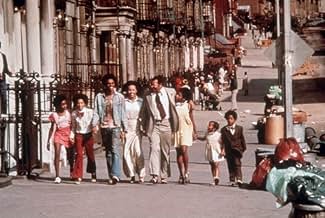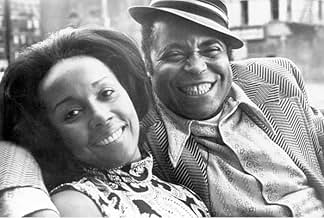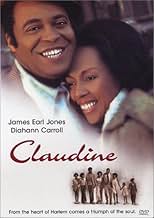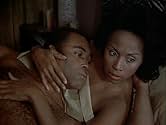Claudine
- 1974
- Tous publics
- 1h 32m
In the 1970s Harlem, garbage collector Roop feels intimidated by the idea of dating Claudine who is a single mother of six on welfare.In the 1970s Harlem, garbage collector Roop feels intimidated by the idea of dating Claudine who is a single mother of six on welfare.In the 1970s Harlem, garbage collector Roop feels intimidated by the idea of dating Claudine who is a single mother of six on welfare.
- Director
- Writers
- Stars
- Nominated for 1 Oscar
- 2 wins & 5 nominations total
- Charles
- (as Lawrence-Hilton Jacques)
- Charlene
- (as Tamu)
- Minister
- (as Harrison Avery)
- Director
- Writers
- All cast & crew
- Production, box office & more at IMDbPro
Featured reviews
Carroll is a wonder. One of the most beautiful actresses of her era, here she manages to be believable as an over-worked, under loved mother in the ghetto. Equal parts pain, pride, vulnerability, smarts and strength she was one of the first African Americans to get an Oscar nomination in a drama. Jones does some of his best film work. Always a great of the American theater, in his early films Jones often came off as too theatrical, larger than life. But here is he subtle, sly, complicated, and very sexy. The young actors playing Carroll's six children are uniformly excellent, often a weak spot in a film like this.
There are problems; some plot turns are predictable, some moments feel a bit 'Hollywood', some of it feels awkwardly dated. But much of it is as relevant as ever, and not afraid to be upsetting and angry along with it's gentle comedy.
Two notes, while often marketed as a 'family' film, this deals with sex and nudity in an honest and realistic way, and it's language is salty and true. Also, sadly, the only available DVD is full screen – too bad since the film was quite nicely shot in its gritty way.
Diahann Carroll, in the title role, plays a single mother raising -- oh, four or five or six -- kids while working as a maid for a wealthy, affluent family.
James Earl Jones, as a garbage man, is smitten with Claudine. However, he has problems of his own, and the idea of committing to Claudine has him running scared.
The characters have pride and love, and, even though this isn't original, I found "Claudine" to be quite inviting. The performances (especially from Carroll, who won a well-deserved best-actress Oscar nomination for a role that had originally been cast with Diana Sands, who had to drop out due to a bout with cancer that would eventually kill her in September 1973) seem flawless, because the actors have a firm grasp and understanding of where "Claudine" is at, in terms of heart, mind, and soul.
And "Claudine" has plenty of those three to spare. It's well-worth checking out, if you haven't already done so.
It appears that the idea of producing these films of particularly keen interest to Black Americans had its genesis with the Eastertime Release of 100 RIFLES (Marvin Schwartz Prod./20th Century-Fox, 1969). In it, former Syracuse University All-American Footballer and Several Times All-Pro Fullback for the Cleveland Browns, Jim Brown, had a Co-Starring Billing. Having appeared in a number of films already, as for example, RIO CONCHOS (1964),THE DIRTY DOZEN (1967), (ICE STTION ZEBRA (1968)* and others, it was beginning to make more sense to the Studios' "Suits" that Jim was a hot property.
Now this 100 RIFLES brings record numbers of Black patrons to the Big Cities' central business districts on Easter Sunday to view Mr. Brown. Why not start to film more of these adventure epics and other types of film with more Black Players and Stars? Why not, indeed.** So we saw a succession of Cops & Robbers, Bad-ass Private Detective Films, Comedies, all going the route. Along the way, we eventually got to some more family oriented, wider appealing films. The movie goers were treated to SOUNDER (1972), THE TAKE (1974), CONRACK (1974)and, ultimately, CLAUDINE (1974).
In CLAUDINE, we find no stigma nor easy classification as being "Blackploitation", as the story is universal, and could easily have been done as a story about people of any descent, any where, and not just in the 1970's USA.
That the story was done of a SINGLE mother, Claudine (Dianne Carroll), struggling to keep a family together after "....two marriages and two almost marriages.", is a far cry from a shoot-em-up Harlem Style. The problems that plague the everyday citizens of our nation are confronted and examined under the ol' sociological microscope.
But we also consider Claudine's psychological and physical needs as a female. For "Woman Needs Man and Man Must Have His MATE",***and we do concede this point. (That's S-E-X that we're talking about, Schultz!) Claudine meets up with a very masculine, broad shouldered, athletic type in Private Scavanger Garbage Man, Ruppert B. Marshall (James Earl Jones) and they go on a date.
The Great Welfare State intervenes with the Couple as Claudine's Welfare Case Worker, Miss Tayback (Elisa Loti), comes snooping around to see just who is this unattached Male, who is suddenly paying so much attention to Claudine's family.
After a humiliating experience with the Welfare Bureau's auditing and "deducting" binge, which would be the norm for the family, the two decide to get married with or without the blessing of Big Brother.
Meanwhile, Claudine's elder son has gotten involved with some big talking but little doing Black Activist group. But, with Ruppert's help, he and they all come through it A.O.K.
It ends on a Happy, Upbeat and Hopeful note. We know that it may not be exactly "...Happily Ever After!", but rather the'll make it all together! If there is a single criticism that we must state it is that sometimes in a movie like this, a misconception is spread to a large portion of Urban Blacks. And that is, the apparent implied myth that all Whites are wealthy, having none of their kind ever in need of a helping hand, out of work or suffering any disabilities.
Well, folks, it just ain't true! NOTE: * At one point, Jim Brown's career was a real hit as a rugged actioner. He was even being tauted as "...The Black John Wayne." NOTE: ** The idea of producing films with All-Black Casts, filmed for All-Black consumption was not a new idea. In the 1920's, '30's and '40's, we saw productions from people like Noble Johnson, Spencer Williams, Jr. and Rex Ingram.
NOTE: *** That's "As Time Goes By", you know, Schultz, it's from CASABLANCA (Warner Brothers, 1942).
Claudine (Diahann Carroll) is a mother on welfare who works on the sly in order to support her six kids. She works very hard at low-paying jobs and has little time for anything other than her kids and work. However, when she meets a vivacious garbage collector, Roop (James Earl Jones), she is swept off her feet and they immediately start sleeping together (if guns have a three day waiting period, shouldn't there be a similar system for sex?). Soon, however, it goes from casual sex and good times to something serious--and that's when troubles begin. It seems that the welfare system is designed to prevent women from having families--and destroying marriage. What's to become of this couple and the six kids? See the film and find out for yourself.
The acting is the best thing about this film. In addition to Carroll and Jones' great acting, Lawrence Hilton-Jacobs has a very auspicious film debut as Claudine's angry and mixed-up oldest son. The film also has a lot of great insights into the stupidity of the welfare system and what it was like to grown up at that time. However, and I know some folks will think I am a jerk for saying it, but I also couldn't help but feel that some of the problems were CLEARLY caused by the characters. Claudine has six kids she cannot take care of and then jumps into bed with Roop on their first date!! Morality aside, this is insane behavior and shows a nutty unwillingness to accept reality. Despite this dumb mixed message, the film, on balance, is well worth seeing.
Did you know
- TriviaDiana Sands was originally cast as the lead, but she died of cancer shortly before shooting began.
- GoofsWhen Claudine and her girlfriends are riding the bus at the beginning of the movie, the bus passes the New Marble Hill movie theatre twice.
- Quotes
Claudine: What are you going to do?
Charlene: Get married, and we'll both work.
Claudine: You'll both work? Together, you'll make one salary. And when the baby comes, they'll be three people living on half a salary. That's the half you can't even count on.
Charlene: Abdullah says that if...
Claudine: 'Abdullah says'? Abdullah's full of crap, that's what he is. He's just like all those other black studs. Full of crap!
Charlene: [close to tears] Mama, black men have made great contributions. George Washington Carver. W.E.B. DuBois. Frederick Douglass.
Claudine: Ain't if just too damn bad you didn't get your ass knocked up by Frederick Douglass!
- ConnectionsFeatured in Il était une fois l'Amérique (1976)
- How long is Claudine?Powered by Alexa
Details
Box office
- Budget
- $1,100,000 (estimated)
- Runtime1 hour 32 minutes
- Color
- Aspect ratio
- 1.85 : 1
Contribute to this page


















